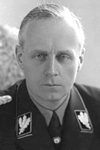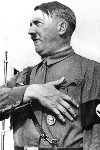Slavs and Slaves Shake Hands
The War Illustrated, Volume 1, No. 1, Page 29, September 16, 1939.
In a last effort at intimidation, Hitler broke completely with his traditional policy and allied himself with the "Bolshevik murderers" he had so often denounced.
For years – since, indeed, the launching of the Nazi Party – Hitler, by writer word and word of mouth, has declared in the most unequivocal fashion, the irreconcilability of German Nazism and Russian Bolshevism.
Turning the pages of "Mein Kampf", you will not go far before you find some expression of the Fuehrer’s hatred of all that Bolshevism is and stands for. With passionate fervour he warns the German people never to forget that the pestilence which rots Russia is one that hangs perpetually over Germany, too. He paints the Bolshevists as vile and bloody tyrants – men who, favoured by circumstances, in a tragic hour of Russia, for Europe and for humanity, were enabled to overrun a great State, massacring in the process millions of their countrymen. Never (he says) in the whole history, has there been a terror so horrible as that which was set up in Russia. And it goes without question that directing this Terror are members of that race which combines the most bestial cruelty with enormous skills in lying – the Jews!
In his speeches, too, Hitler has been at no pains to give expression to the belief that Nazism and Bolshevism are ideological opposites. At Nuremberg, in September 1936, he said that: "We see in Bolshevism a bestial, mad doctrine which is a threat to us. In the past Bolshevism tried to work on our territory just as it is now trying to push its military forces ever closer to our frontiers. We exterminated Bolshevism on our own ground. We warded off the attempt to infect Germany from Moscow".
On February 22, 1938, he said that which one country "we have refused to enter into relations. That State is Soviet Russia. We see in Bolshevism the incarnation of human destructive forces". At the Nuremberg congress of 1938 he declared that "the danger of Bolshevist destruction in other5 nations is towering over our world more menacingly than ever".
The Anti-Comintern Pact made by Germany, first with Japan and then alter with Italy as well, was regared in Moscow as a direct threat to Soviet Russia. In the Spanish Civil War German airmen, troops and technicians helped Gerenal Franco to save Spain from what Hitler declared in his address to the returning warriors was "the fire of a revolution fanned by international forces, which was intended to lay not only Spain, but Europe in dust and ashes".
We can thus understand the gasp of amazement which went round the world when on August 21, 1939, it was announced that Germany and Russia were to sign a pact of non-aggression, and that von Ribbentrop would proceed to Moscow on August 23 for that purpose.
So complete a reversal of policy was almost without precedent in history.
Some said that the Pact demonstrated that Nazism and Bolshevism were but different faces of the same thing. Others saw in it a clumsy attempt by the Nazi diplomatists to frighten Britain and France from implementing their agreements with Poland.
If this were indeed the reason, it failed its object. The Nazi’s forgot that to the Democracies treaties are solemn obligations, and policy has its foundations in something more substantial than the shifting sands of a temporizing diplomacy.
Index
Previous article
Words That History Will Remember
A Record of the Vital Declarations and Solemn Statements of the World's Leaders. Wednesday, Aug. 23, 1939 King Leopold of the Belgians: Broadcasting in the name of the King of Denmark, the Presid
Next article
Germany on the Eve of the Nazi Betrayal
When, a week before the invasion of Poland, the correspondents of the British press were withdrawn from Berlin, a curtain descended upon Germany, cutting it off, as it were, from the outside world. Oc





